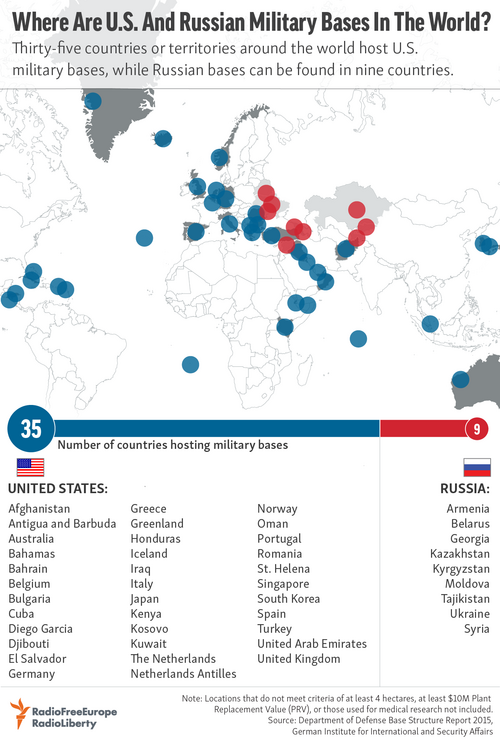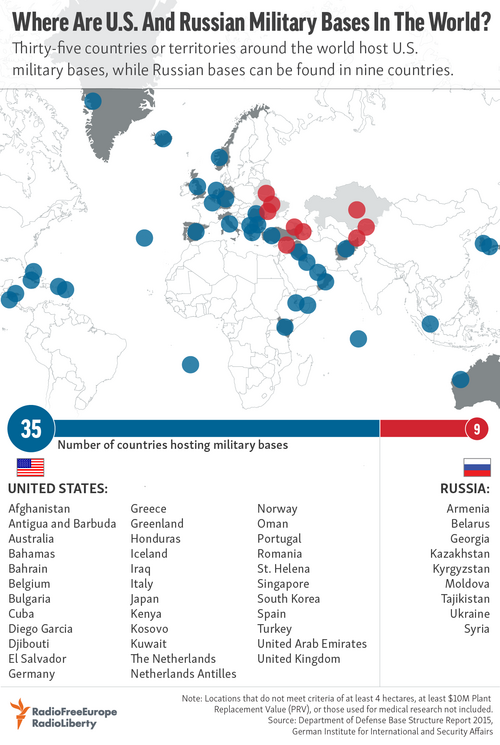That map isn't even slightly up to date. Where are all the Wagner bases in Africa (Libya, Mali, Niger, Burkino Faso, CAR etc.)? Spy base in Cuba? Nicaragua base also not noted.
The point is no one cares about those because they don't literally surround Russia with potential JSF stealth bombers and their nuclear weapons, which is the point I was making. RuMOD sees this little spat Russia has with the U.S. State Department (literally no one else cares besides them and the Treasury) as a Barbarossa-by-stealth.
It'd probably be true if the DOS could think that far ahead, but it's mostly just being a vindictive gadfly, because of complicated reasons...
Russia is agitated because, since about 2007 which is when Putin finally figured out how America works, he is deathly afraid America will turn Russia into its next international relations thesis project. If Iraq was an attempt to bring democracy by B-52, Russia may be an attempt to bring democracy by B61, and this is why the Strategic Rocket Forces have been successively winning in every major procurement round since Putin started running Russia.
The starting point for the tit-for-tat of the present situation is 1990, 1993, or 1997, because that is when America either promised something, changed the deal to an emasculated Yeltsin, or broke that promise outright, and all when Russia was too weak to do anything besides acquiesce. Which timeframe you get depends on who you ask and whether they work for the Russian government or the U.S. State Department.
The U.S. State Department would say that it never violated the letter of the informal agreements because Warren Christopher wanted to be "cool" like George Kennan and figured nuking Russian relations would make him (finally) "cool", while Gorbachev would say America violated the spirit of the agreements, because Gorbachev is sad he got couped by Yeltsin or something, and the main disagreement is if the "spirit" or "letter" of the agreement was most important.
Since all the above people mentioned are dead we'll never get their words on the subject again, but that's the start of it.
Ironically, DOD wanted to incorporate Russia into multinational planning at the time, but SECDEF Perry was overruled by SECSTATE Christopher, because the DOS has a hate boner for slapping Russia around and everyone in America who wants to appear smart (but is actually incompetent) looks at the DOS as a paragon organization.
If SECDEF Perry's preference for trying to integrate Russia into NATO planning apparatus (and stalling much of the eastwards expansion semi-indefinitely) had been done, the U.S. would have had Su-25TMs to call on in the Afghanistan invasion to fight the Taliban with, but alas...
Point being that what you see as "Russia trying to build an empire in Europe" (a common Eastern European propaganda line which is mostly rooted in pro-Austro-Hungarian imperial revisionism [I'm not joking]) is actually "Russia reacting to decades of shadow warfare by the U.S. State Department against its sovereignty" in a very literal sense. The DOS is extremely good at sub-kinetic methods of warfare, and often has the CIA and NED on its side, but the CIA may be siding with DOD in the current Civil Service: Civil War spat over whether RuFed or PRC are the bigger backyard bully.
As to why it did all this, well the U.S. Department of State probably feels cheated out of the Cold War, because it doesn't understand how it won. Or maybe it does, because I'd imagine if it realized it won without doing anything noteworthy, and the Soviets just noped out of the Great Game, it would make a lot of bureaucrats mad. The U.S. Defense Department's support for the Partnership for Peace is likely what soured it completely on the idea back in 1994.
NATO expansion, and thus a deliberate friction with Russia rather than friendship, was the inevitable result of this DOS meddling.
Dr. M.E. Sarotte's
Not One Inch: America, Russia, and the Making of Post-Cold War Stalemate is an excellent introductory text for the subject of modern Russian-American relations. It's quite cheaply available from Yale University Press.




